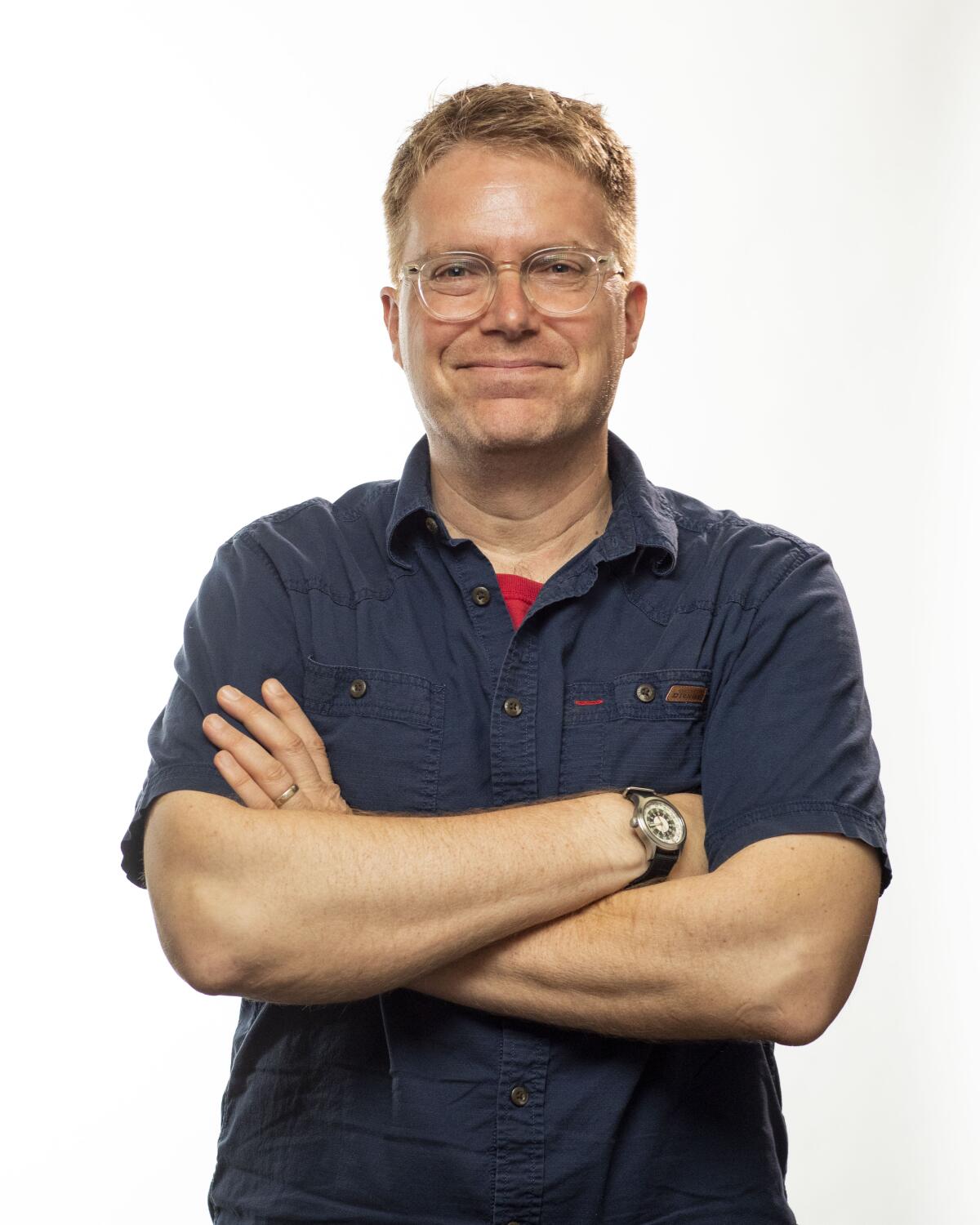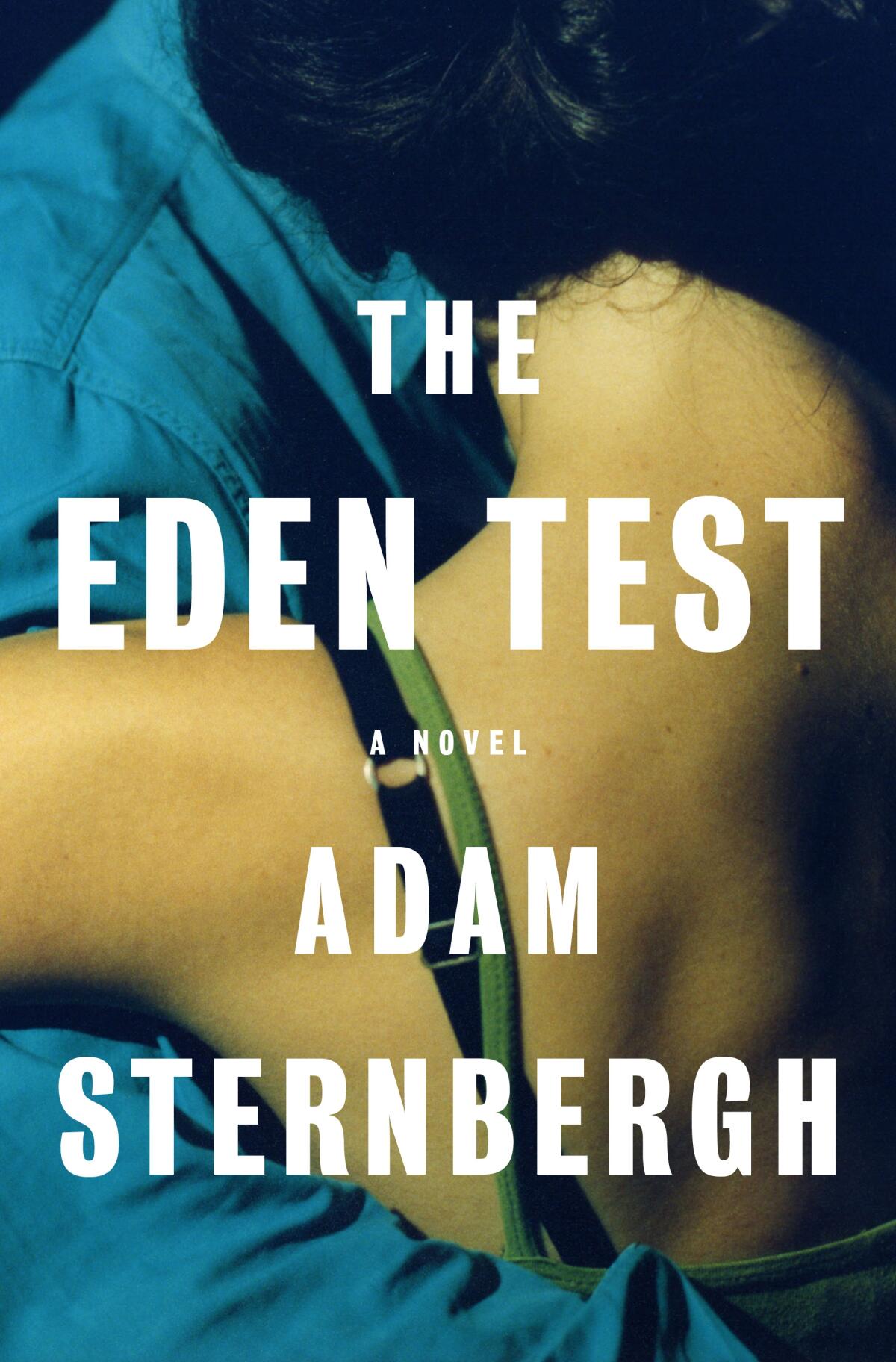Sign up for our Book Club newsletter
Get the latest news, events and more from the Los Angeles Times Book Club, and help us get L.A. reading and talking.
You may occasionally receive promotional content from the Los Angeles Times.

On the Shelf
The Eden Test
By Adam Sternbergh
Flatiron: 336 pages, $28
If you buy books linked on our site, The Times may earn a commission from Bookshop.org, whose fees support independent bookstores.
“What’s the worst relationship advice?”
Adam Sternbergh laughed and considered the question. His seductive new domestic thriller, “The Eden Test,” explores the lengths to which a couple will go to save their marriage. Maybe that doesn’t make him the best person to ask for marital advice, but it’s something he’s been thinking about since 2019.
“One of the pieces of advice that gets people into trouble,” said Sternbergh during a call from his apartment in Brooklyn, where he lives with his wife and two children, “is this notion that if the relationship isn’t working, all it needs is more effort. … You can fix it. You just haven’t figured out the way to do it yet. I think that’s something that can trap people.”
Entrapment certainly applies to the protagonists of “The Eden Test.” On their second wedding anniversary, Craig and Daisy have decamped from their Brooklyn apartment for a cabin in the woods in upstate New York. The property is owned by the Edenic Foundation, which offers its sanctuary in the wilderness for couples looking to reset their marriage. There’s even an apple orchard full of forbidden fruit to ramp up the biblical implications.
The 13 most essential L.A. crime books — from Chandler, Hughes, Mosley and Ellroy to Steph Cha and Ivy Pochoda, with some ‘Helter Skelter’ in between.
Over the course of seven days the couple are presented with a new question every day, which they must answer together. There isn’t any cellphone or internet service so they can’t phone a friend for assistance. They’re stuck with each other, and as the questions become more difficult, the stakes get higher.
Because this is an Adam Sternbergh story, there’s a twist — several twists actually. Sternbergh is a novelist who delights in putting his characters in grim situations from which there is seemingly no escape. His first two novels, the Edgar-nominated “Shovel Ready” and its sequel, “Near Enemy,” are neo-noirs set in a dystopian New York. “The Blinds,” his previous novel, takes place in a purgatorial no-man’s land deep in the heart of Texas inhabited by criminals who have had their memories scrubbed. They’ve been given a second chance, but with one critical caveat: They can never leave.
“I’ve always been drawn to stories that are in some way claustrophobic,” Sternbergh said. “I love a locked room mystery, the Agatha Christie-style whodunit, but my favorite play in college was ‘No Exit.’”
Although Sternbergh came up with the concept for “The Eden Test” prior to the pandemic, it feels like a novel that was written under lockdown. Craig and Daisy are thrust into a situation in which they have to deal with each other whether they like it or not — a scenario that will sound familiar to anyone who weathered the worst of COVID-19 in close quarters.
The author likened his quarantine experience to being in a lifeboat: “We were all just clinging to this little rubber dinghy as it was flung up and down. ‘We’re gonna make it through this together or we’re going to go down together.’ But the key word is ‘together.’ I feel like that is very present in the book.”
Over the last three months, 17 writers provided diaries to the Times of their days in isolation, followed by weeks of protest. This is their story.
“The Eden Test” even echoes the flight of the affluent from cities to rural outposts whose inhabitants aren’t always so welcoming of the new arrivals (a.k.a. “citiots”).
Like all couples, Daisy and Craig have baggage — both literally and figuratively. When we meet Craig he’s planning to leave his wife for another woman, his bags already packed for a flight to Cabo San Lucas. Daisy also has secrets, but hers are much darker and more dangerous. And like most secrets, they refuse to stay in the past.

Daisy is an actor, adept at playing roles even for those closest to her. She has always kept Craig in the dark about her history, which gets more difficult to do as “The Eden Test” unfolds.
“One of the things that evolved in the novel as I was working on it,” Sternbergh said, “is that it became a book about theatricality.”
The author’s wife, Julia May Jonas, is also a novelist as well as a playwright; her most recent play had a run at New York’s Lincoln Center. But as Sternbergh fleshed out Daisy’s story, he drew on his own theater background. He grew up in Toronto, and in the ‘90s was part of a sketch comedy group called Joke Boy. “It was post-‘Kids in the Hall,’” he explained, “and there was a lot of energy in Toronto around the idea that you could start a comedy group and be the new ‘Kids in the Hall.’”
For the record:
6:36 p.m. April 25, 2023An earlier version of this article erroneously stated that Julia May Jonas’ last play was staged at the Kennedy Center in Washington, D.C. It had a run at Lincoln Center in New York City.
Although Sternbergh insists “I was a terrible actor,” he did appear sporadically on Canadian television. After college, he wrote for various magazines in Canada until he was invited to apply for a position at New York magazine. “I was on the next plane,” he said. Sternbergh worked on and off for New York and the New York Times Magazine for more than a decade; he was recently named a Times Opinion culture editor.
Julia May Jonas’ “Vladimir” is a thrilling “Lolita” update in which the deliciously wicked narrator is not the male abuser but his wife.
Sternbergh chose writing over a life in performance, but Daisy is completely committed to her acting career. For reasons that are revealed in the novel, she doesn’t seek the spotlight, which allows her to hone her craft. In “The Eden Test,” she’s constantly imagining herself on the stage:
“It’s all about the moments around the words, between them, the crackle of implied meaning, the feint and parry of unspoken intent. People call it acting, but isn’t this just what we all do every day? Play a role, be who we know someone needs us to be, recite our expected lines, all while searching for some clue as to the other person’s real meaning, their honest motivations?”
Through Daisy, Sternbergh investigates the similarities between public performance and the kind we do for the scene partners in our own lives — especially when the show isn’t going so well. “If you’re really good at embodying characters, what does that mean?” he asked. “If you’re in a long-term relationship with someone, to what extent is that also about embodying a character or playing a role?”
If you think Sternbergh is being hard on actors, writers fare much worse in “The Eden Test.”
To call Craig a struggling writer is being generous. Committed to at least the idea of being a novelist, he dreams up acceptance speeches for the awards he will someday receive, clings to lifestyle fantasies conjured by Hemingway and Henry Miller, but the only writing he does is for a marketing company in Brooklyn, “the texts he sends to social media influencers trying to recruit them to get paid to show up at events and pretend to like some new vodka.”
Craig is no Nick Adams, but did Sternbergh project his own impostor syndrome onto Daisy’s poseur husband?
Not exactly, though he admits to experimenting in his early New York years with a persona that was “a combination of the person you hope to be, the person you wish you were, and the person you think the people around you want you to be. … It’s part armor and part aspiration.”
The difference is that Sternbergh has written and edited thousands of articles. “Craig is the kind of person who doesn’t want to do the work,” Sternbergh said. “He doesn’t want to do the work in his relationship. He doesn’t want to do the work of being a writer. He just wants the spoils.”
Which of course prompts the question: Is his relationship even worth saving? This is the big question underlying the seven smaller ones he and Daisy are asked in the isolated cabin: Can they resuscitate their marriage or should they let it die?
Of course, it’s not that simple. There are other actors on the stage who will have their say. Sternbergh skillfully reveals information so that at various points in the novel the reader must reconsider whom they’re rooting for and why. As the story’s many twists expose Daisy and Craig for who they really are, they come to understand that once the worm turns, the forbidden fruit isn’t quite so appealing.
Ruland’s new novel, “Make It Stop,” is out now.
Sign up for our Book Club newsletter
Get the latest news, events and more from the Los Angeles Times Book Club, and help us get L.A. reading and talking.
You may occasionally receive promotional content from the Los Angeles Times.